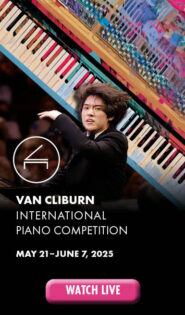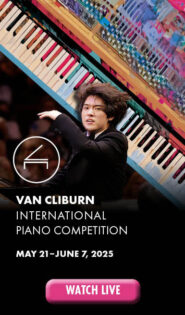There’s nothing small about Fort Worth Opera’s silver screen “Don Pasquale”

Audrey Luna played a Hollywood starlet Norina in Fort Worth Opera’s production of “Don Pasquale” Saturday night at Bass Performance Hall. Photo: Ben Torres
Fort Worth Opera’s production of Donizetti’s Don Pasquale, which opened Saturday night at Bass Performance Hall, channels the 1950 movie classic Sunset Boulevard for an unfailingly intriguing, often hilarious take on this masterpiece of comic opera.
Director Chuck Hudson, known for his innovative approach to opera, created this version for Arizona Opera in 2014, with whimsical sets by Peter Nolle and equally engaging costumes by Kathleen Trott. With a few minor adjustments in the text, some added scene-change music (with fake classic film footage) and lots of mild visual slapstick, the production neatly enhances and retells this predictable romance for 21st Century audiences.
In this version, reset in Hollywood in the 1950s, Don Pasquale becomes a silent film star who has outlived his fame (a la Norma Desmond); Turkish-born bass-baritone Burak Bilgili takes on the title role with a beautifully flexible and smooth vocal quality, all the while visually communicating the character of an aging but lecherous bachelor. Baritone Andrew Wilkowski, meanwhile, finds the perfect balance for the role of the scheming but well-intentioned Malatesta as a 1950s-style playboy doctor with a Hollywood clientele. Wilkowski set the vocal tone for the evening with a suave rendition of the first principal aria in the score, “Bella siccome un angelo”: He and Bilgili scored the most memorable moment of the show later on in the duet “Cheti, cheti, immantinente,” in which Donizetti creates a patter aria duet to amuse and amaze, a task Bilgili and Wilkowski achieved neatly.
Soprano Audrey Luna, meanwhile, blazed and bounded through the role of Norina; Donizetti created Norina as a young woman with a bit more knowledge than the typical operatic ingenue, so presenting her as a Hollywood starlet was a superb concept. Luna first appears in a bubble bath (with cameras rolling), delivering the trills, high notes, and other vocal acrobatics of “So anch’io la virtù magica” with impressive skill and ease, all the while performing a reverse strip tease that would have done Gypsy Rose Lee proud.
Tenor Ji-Min Park bounced boyishly through the role of Norina’s beloved (and Pasquale’s nephew). Although his voice is strong and attractive, he failed for much of the evening to bring any musical nuance to his part, only managing to turn the volume down below forte for Ernesto and Norina’s love duet, “Tornami a dir che m’ami.” The Fort Worth Symphony and conductor Joe Illick maneuvered with an appropriately lyrical but light touch through a score that has one foot in the classical era and one in the romantic.
Visually, the Hudson-Nolle-Trott version provides endless fascination, opening in drab black-and-white but gradually shifting to brilliant technicolor. Indeed, the varied colors and occasional comical inconsistencies enhance the subtly dreamlike quality lurking near the surface of this tried-and-true plot. When Norina takes over the show as Pasquale’s temporary bride, ’50s-style “Danish modern” furniture replaces Pasquale’s aging Hollywood opulence, while the chorus enters dressed as mid-20th Century celebrities and characters: Groucho Marx, Annie Oakley, Doris Day, and Carmen Miranda romped together onstage, in a sort of surrealistic cast party that could never really have happened.
The final “garden scene” is set at the Hollywood Bowl, with Park as Ernesto striking a cool, Sinatra-esque pose. Tellingly, only Bilgili as Pasquale remains pale and monochromatic throughout, as this musical parable of the triumph of young love takes on the frothy zaniness of the golden age of Hollywood’s dream factory.
Fort Worth Opera’s production of Donizetti’s Don Pasquale will be repeated at 7:30 p.m. on May 4 and 2 p.m. on May 6 at Bass Performance Hall. fwopera.org; 817-731-0833.

